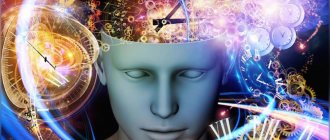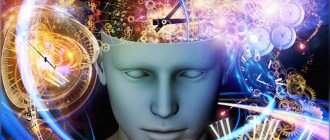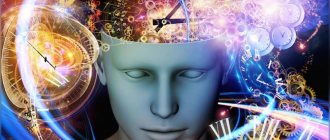Phenomenal memory is the human ability to exceptionally remember information at high speed and then accurately reproduce it. A person who has such a memory does not need a semantic connection between components; he can remember random numbers, dates, data. Many famous personalities were famous for their exceptional memory, but even an ordinary person can develop it by constantly doing exercises. To develop similar skills, you need to understand how memory works, what types there are, and how to train your brain.
How memory works
We take memory for granted, but scientists are still studying the human brain and are amazed at its capabilities, including memory.
Without the ability to remember, we would not be human, because our personality is a collection of memories and conclusions drawn from them.
From a scientific point of view, memory is information encoded in the brain in the form of signals transmitted and changed between neurons. This is a complex process involving billions of neurons, each part of the brain responsible for a specific type of memory.
The parietal cortex of the brain is responsible for musical abilities; when a person needs to play an instrument, this area is involved. The hippocampus is responsible for new memories. If it is removed, then the person will remember the past, but will not be able to remember new information, it will simply be instantly forgotten.
The localization of memory has not been precisely proven, but the hypothesis that each area is responsible for its own type of memory remains relevant.
There is a procedural memory, it is not connected with the hippocampus, so it is impossible to unlearn how to ride a bicycle, run, walk, or swim if it is removed.
Scientists cannot say exactly how long-term memory works; the exact mechanisms of memorizing information and storing it have not been studied. There are only guesses and assumptions. But a memorization algorithm has been identified that works on all healthy people:
- the process of capturing information;
- retention in the brain;
- reproduction;
- forgetting.
People tend to quickly forget information that is not valuable and is not relevant. This rational use of neural networks allows us not to think about everything we know, giving us the opportunity to focus on new knowledge.
Phenomenal memory is also not fully understood. People with this ability can extremely quickly process new information in their brain and store it, when a person with ordinary memory quickly forgets random data that is not supported by meaning, emotions, etc.
People with phenomenal memory can look at a piece of paper with random notes on numbers, words, dates, facts and remember them by heart in a few seconds, and then voice what they saw exactly. This is amazing and opens up new boundaries of human capabilities.
№11
Human memory is divided into three types: sensory, short-term and long-term. The first type is the first stage when the brain receives information and visualizes it. On average, sensory memory lasts no more than 3 seconds. Then it develops into short-term memory, which lasts about 20-30 seconds. Then the short-term is converted into long-term. It is also worth noting that not all information received goes through these three stages.
We also recommend reading: Interesting facts about Shakespeare
Kinds
Phenomenal memory also comes in several types, just like ordinary memory, depending on the area responsible for the type of memory. This means that people do not remember absolutely everything, but rather remember information best in a certain way.
The most popular type is photographic memory. It is characterized by an accurate reproduction of the picture of what was seen, be it a route somewhere or the arrangement of things in a room. A person with such a memory can easily remember, even after many years of absence, what was located, where it was, what was built, etc.
Auditory phenomenal memory is less common; most often it is characteristic of composers and musicians. A person who has this type of memorization can easily reproduce audio information. As soon as he hears something, it is immediately stored in his brain. Such people can write down what they hear from memory in a notebook or immediately repeat it on their musical instrument.
There are also individuals with mathematical memory who can easily do complex calculations in their heads and remember these processes.
And there are those who easily reproduce information received in text form. Such people only need to read it once and that’s it. They can recite paragraphs, novels, stories, etc. by heart.
Books on the topic
The book by Stanislav Matveev is worthy of attention (on some sites the author is erroneously presented as “Matvey”). In his work, Stanislav shares methods of memorizing information and uses practical examples to prove that anyone, not just a personality-phenomenon, can achieve fast and high-quality memorization of information.
An interesting method of work is proposed by Konstantin Dudin. His method can be found online. According to Dudin, in order to have supermemory, you must, first of all, learn to forget unnecessary information, that is, to make room for new, more relevant information. This will help relieve the brain during memorization and save you from overload. Dudin's course includes a separate section on forgetting.
Harry Lorraine's course is very popular in the West; it can be recommended to students of any age, adapting the exercises to a specific target audience.
Before starting classes, you should familiarize yourself with the educational literature
It is recommended to start memory training for boys and girls from childhood, then it will be possible to achieve the desired results faster and better. However, it is possible to develop phenomenal talents for memorization in a person both in adolescence and adulthood. The main thing is perseverance, perseverance and working according to the system, in accordance with the chosen methodology.
How to develop phenomenal memory
To surprise others with instant reproduction of information, you need to train your memory.
Our brain has limitless possibilities if it is developed. First, you should get into the habit of memory exercises. Only if you practice daily for a long period will the result be visible.
To do this, you need to sit down and try to reproduce the information in your brain into images:
- Colored: the more spectacular, the better the information will be reflected;
- Volumetric: spatial thinking will be useful to consider memories from different angles;
- Large: the larger the image, the more space it will take up in the brain and the better it will be remembered;
- Detailed: do not forget about the details and little things, they matter;
- Bright: the brighter, the easier it is to remember; dull and nondescript images are quickly lost.
In addition to developing memory through imagery, there are other techniques. Some of the most popular are associative and mnemonics.
The essence of such exercises is to find an association with anything to strengthen the semantic connection and store information in the brain. Some people try to find a pattern in the numbers or associate them with the birthday of their relatives. Others associate numbers not with dates, but with images: two is a swan, five is the English S.
Mnemonics involves the development of event chains for better memorization. If a person is given random words that are in no way connected with each other, then he should come up with a story that involves all the objects.
For example, a number of words are given: candy, scarecrow, bottle, sock, snow. Using mnemonics, we come up with a series of events: the scarecrow found candy in a bottle and poured it into a sock while it was snowing. The main goal of the technique is not only to come up with a chain of actions, but also to clearly present it.
This type of memorization is often used in language learning apps. While you are learning words, the program suggests looking at a picture to create a connection with the word, and suggests reading a phrase involving the word being studied to create an image and a vivid event.
Another effective method to train the brain and develop memory is mindful reading. To do this, you just need to regularly read, take notes, and speak out the information you have learned. It is important to read not for the number of pages, but for the information, having time to analyze every word.
Eidetic memory
People involved in self-improvement repeatedly wonder how to develop eidetic memory, because it is this type of memory that opens up good opportunities for a person who strives for constant development of himself as an individual.
What does it represent?
Eidetic memory - (more often called photographic, since it is mainly visual) a special type of memory, based primarily on visual impressions. This type allows you to retain and reproduce in small details images of previously perceived phenomena or objects.
People who have such a memory are called eidetics. Some scientists argue that children and adolescents can boast of eidetic memory at the stage of active brain development. Among adults, this type of memory is extremely rare (5-10%).
How to develop?
It is possible to develop eidetic memory. Every year more and more highly specialized schools appear that help people discover previously unknown abilities.
There are many special exercises aimed at independent work on memory capabilities. Let's look at a few of them.
- Observation! Look around the room you are in. Choose an object that is 2-4 places away from you. Watch him for a few minutes. Study every detail carefully. Then close your eyes and try to recreate the complete image of the chosen item in your head. If some nuance is lost in your memory, you can open your eyes for a second to look and continue the exercise.
- Before and after! You need to start the task on the move. Suitable option: in the morning on the way to work/school/university, choose a bright object. Try to remember it, taking into account even the smallest characteristics. Throughout the day, reproduce the object you saw in your head. On the way home, compare the image in your mind with what it really is.
- Videoscope. Try watching one object for 2-5 minutes, then suddenly shift your gaze to some other thing. Watch her for the same amount of time. Then close your eyes and try to mentally combine the two images together.
Famous personalities with phenomenal memory
Phenomenal memory has helped many people become outstanding and go down in history.
Knowledge is power, and these people were able to remember it and apply it competently.
- Napoleon. Historians say that the French leader knew his military personnel by heart: by sight and name. He could also retell in detail a book he had read many years ago.
- Theodore Roosevelt. He was able to do many things at the same time and was famous for multitasking. The US President read 2-4 books daily, memorizing the contents and easily retelling them in detail to his family and colleagues.
- Nikola Tesla. The world-famous inventor, who gave humanity research on alternating current, was famous not only for his discoveries and deep knowledge in the field of physics and engineering. He had a photographic memory, which helped him store a huge amount of information in his brain. The researcher rarely wrote down notes because everything was stored in the safest place - memory. When the laboratory suffered a fire, he easily recovered the data thanks to his phenomenal memory.
- Alexander Alekhin. The Russian chess player, famous in the 20th century, according to contemporaries, could play simultaneously with dozens of opponents, easily switching between games, thanks to his memory and rapid processing of information. He easily remembered combinations and moves, which gave him an advantage in the game and made him a great grandmaster.
- Sergei Rachmaninov. He had a phenomenal auditory memory, could remember a complex piece in a few seconds and reproduce it, write it down in a notebook. Thanks to his skills, he became an outstanding pianist, composer and conductor.
These people made a huge contribution to the development of humanity and not without the participation of their amazing ability to quickly remember. Phenomenal memory is not a fiction or a myth, but a real skill that can be innate or acquired if you train it regularly.
Examples of people with such memory
Phenomenal memory is a phenomenon characteristic of many outstanding personalities. It is known that such abilities at different times were possessed by:
- Physicist Nicolo Tesla;
- Composer and pianist Sergei Rachmaninov;
- Pope John Paul II;
- Garry Kasparov, famous chess player;
- Julius Caesar, ancient Roman emperor.
It is noteworthy that most outstanding individuals with super abilities were just as successful in other areas (for example, Julius Caesar was not only an influential politician, but also an excellent commander). Therefore, psychology experts who consider extraordinary memory an anomaly are not always right.
High speed of memorization will help on the path to fame
Adviсe
To have exceptional abilities, regular practice to improve them is important.
Here are some tips to help you master phenomenal memory:
- Spend at least 15 minutes a day training your brain and memory;
- Play chess;
- Read consciously, retell what you read out loud;
- Solve puzzles, puzzles, crosswords, rebuses;
- Learn poetry or prose by heart;
- Do mathematics, do not delve into integrals and logarithms, even solving arithmetic examples has a strong effect;
- Try to constantly train your memory in life by memorizing phone numbers, addresses, names, shopping lists, car numbers, random facts about people;
- Don't neglect your health and eat right;
- Play sports, scientists have found that this has a beneficial effect on intellectual abilities;
- Get enough sleep and don’t get overtired, give yourself a rest if you’re tired;
- Don't forget to walk and breathe fresh air.
By following these tips, you can improve not only your memory, but train your brain, make yourself a more well-read and interesting person.
The rudiments of memory begin to form in a person in the womb, at 5 months of pregnancy
Thus, the embryo learns to remember and recognize sounds and reacts positively to the mother’s voice and familiar music. The peak of memory development occurs at the age of 19-25, which is why this time is great for getting an education. Well, memory fades after 50, and only in people who don’t train it. For example, the same teachers, actors or researchers can maintain clarity of mind until death due to the characteristics of the profession, which forces them to constantly memorize large amounts of new information.











